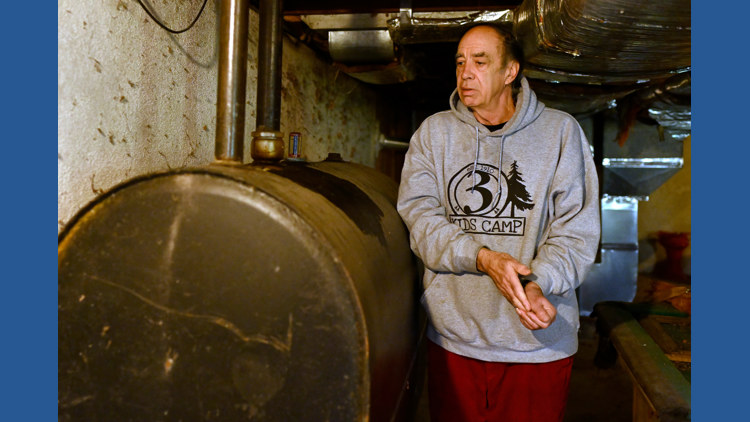Top Stories
Urgent: Government Shutdown Delays Heating Aid for Millions

UPDATE: The ongoing federal government shutdown threatens to disrupt vital heating assistance for millions of low-income families across the United States. With the shutdown now in its fifth week, states are warning of significant delays in funding from the Low-Income Home Energy Assistance Program (LIHEAP), which supports families in heating their homes.
Retired school aide Jacqueline Chapman, 74, from Philadelphia, is among those affected. Relying on a mere $630 monthly Social Security check, she faces uncertainty as her heating aid hangs in the balance. “I feel like I’m living in scary times. It’s not easy to rest when you know you have things to do with limited funds,” Chapman stated.
The $4.1 billion LIHEAP program serves approximately 5.9 million households nationwide, providing essential heating and cooling assistance. As temperatures drop, states like Pennsylvania, New York, and Minnesota have already announced that their LIHEAP programs will be delayed due to the shutdown. In Pennsylvania alone, about 300,000 low-income households may not receive their expected heating aid until at least December, rather than the usual start in November.
Mark Wolfe, executive director of the National Energy Assistance Directors Association, stressed the urgency: “The impact, even if it’s temporary, on many of the nation’s poor families is going to be profound if we don’t solve this problem.” He noted that this unprecedented situation is compounded by delays in the Supplemental Nutrition Assistance Program (SNAP), which assists roughly 1 in 8 Americans with food purchases.
As states grapple with funding shortages, energy prices continue to soar, putting even more pressure on vulnerable families. LIHEAP, established in 1981, has historically received bipartisan support, but the lack of a full spending bill for the fiscal year beginning on October 1, 2023, has left states without necessary allocations.
In Connecticut, officials are considering using state budget reserves to temporarily cover heating assistance costs, but uncertainty looms if the shutdown persists. The state’s LIHEAP program typically helps more than 100,000 households each year, and the situation is expected to worsen as winter progresses. “The situation will get much more perilous for folks who do need those resources as we move later into the heating season,” warned Rhonda Evans, executive director of the Connecticut Association for Community Action.
In Minnesota, the Department of Commerce indicated that federal LIHEAP dollars would likely be delayed by a month, further complicating the heating assistance landscape. “As temperatures begin to drop, this delay could have serious impacts,” they cautioned.
A spokesperson for the U.S. Department of Health and Human Services attributed the delays to congressional Democrats, with promises to expedite LIHEAP once the government reopens. However, skepticism remains regarding the timing of funds and the potential impact of staff layoffs at the program.
Families like Chapman’s and Mark Bain, 67, from Bloomfield, Connecticut, are anxiously awaiting assistance. Bain, who has been approved for $500 in heating aid this year, expressed concern about timely deliveries as he relies on heating oil to keep warm. “I would turn the heat down to like 62 degrees and throw on another blanket, just to get through,” he said, highlighting the tough choices many face.
With the government shutdown showing no signs of resolution, the urgency for families in need is palpable. The time for action is now, as millions await critical support to stay warm this winter. As the situation develops, officials and advocates across the country are urging Congress to prioritize these essential aid programs to avert a crisis for low-income households.
Stay tuned for more updates on this developing story.
-

 Science2 weeks ago
Science2 weeks agoInterstellar Object 3I/ATLAS Emits Unique Metal Alloy, Says Scientist
-

 Business2 weeks ago
Business2 weeks agoIconic Sand Dollar Social Club Listed for $3 Million in Folly Beach
-

 Politics2 weeks ago
Politics2 weeks agoAfghan Refugee Detained by ICE After Asylum Hearing in New York
-

 Health3 weeks ago
Health3 weeks agoPeptilogics Secures $78 Million to Combat Prosthetic Joint Infections
-

 Science2 weeks ago
Science2 weeks agoResearchers Achieve Fastest Genome Sequencing in Under Four Hours
-

 Lifestyle2 weeks ago
Lifestyle2 weeks agoJump for Good: San Clemente Pier Fundraiser Allows Legal Leaps
-

 Health2 weeks ago
Health2 weeks agoResearcher Uncovers Zika Virus Pathway to Placenta Using Nanotubes
-

 World3 weeks ago
World3 weeks agoUS Passport Ranks Drop Out of Top 10 for First Time Ever
-

 Top Stories2 weeks ago
Top Stories2 weeks agoChicago Symphony Orchestra Dazzles with Berlioz Under Mäkelä
-

 Business3 weeks ago
Business3 weeks agoSan Jose High-Rise Faces Foreclosure Over $182.5 Million Loan
-

 Entertainment2 weeks ago
Entertainment2 weeks agoJennifer Lopez Addresses A-Rod Split in Candid Interview
-

 World2 weeks ago
World2 weeks agoRegional Pilots’ Salaries Surge to Six Figures in 2025







